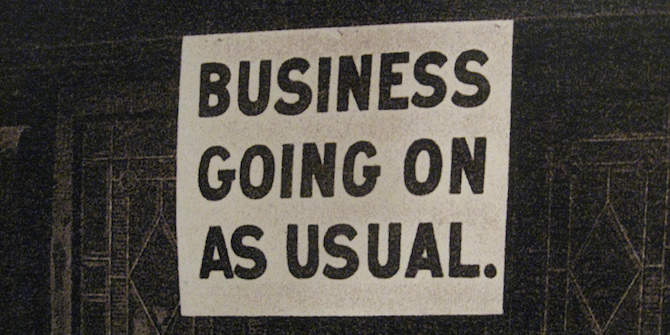 The collective rage directed at US Credit Rating Agencies is an important development in the eurozone crisis. Yet, as Olaf Cramme explains, this reaction mainly brings home the extent of the profound tensions between growing external constraints, national sovereignty and democratic legitimacy in the EU and beyond.
The collective rage directed at US Credit Rating Agencies is an important development in the eurozone crisis. Yet, as Olaf Cramme explains, this reaction mainly brings home the extent of the profound tensions between growing external constraints, national sovereignty and democratic legitimacy in the EU and beyond.
To many, disunity has been one of the prevailing characteristics of the eurozone’s sovereign debt crisis. Creditor states blame debtor countries for irresponsible fiscal profligacy and undermining the common currency. Germany is accused of not providing sufficient leadership in solving the crisis, despite holding the key to it. Meanwhile, an endless dispute about the nature of private sector participation in restructuring Greek debt has opened up a rift between a defiant ECB and member states under severe domestic pressure to prevent a “transfer union” at all costs.
Lately, however, EU policymakers have formed a more united front in decisively rallying against what they perceive as a major nuisance: American credit rating agencies (CRAs). Their power was feared even in Britain where the government has found itself stalked by the regular threat of downgrading from its triple-A rating if the toxic combination of slow growth and weaker-than-expected fiscal consolidation efforts continue.
Two recent decisions by the CRAs’ finally triggered the collective outrage: first, the downgrade of Portuguese and subsequently Irish debt to nothing less than junk status; and second, the rebuff of a French-inspired proposal to allow for a simple debt rollover in a second Greek rescue package.
In the case of the former, politicians have bitterly complained about the purported disregard for the substantial efforts of the sinners to comply with the strict conditionality of bail-out programmes. How can a national consensus for austerity politics in addition to wide-ranging EU guarantees and assistance lead to a ranking below that of genuine trouble spots such as Pakistan or Cambodia? – they rage.
The latter, in turn, smacked even more of anti-European bias. A blunt warning that any voluntary scheme to involve private bondholders would be classified as a “selective default” (to be avoided at any rate according to many experts) led EU leaders to abandon their original proposal on the spur of the moment and re-open painful negotiations. This time, it was not only ‘politics behind the markets’, but an outright dictate of what will be accepted and what not – or so it felt.
The political riposte was all but surprising. Single Market Commissioner Michel Barnier led the chorus in criticising the disproportionate influence that is exerted by the three dominant players – Moody’s, Fitch and Standard & Poor’s – controlling over 90% of the credit rating market. He promised to put forward, in the autumn, extensive measures to tame their powers, make their analysis and decision-making processes more transparent, and ensure more competition in what has deprecatingly been labelled an oligopoly.
If this was not enough, Barnier is said to be considering a complete ban on ratings for countries that are covered by international rescue packages, as well as the creation of a European agency as a counterpart to US dominion. The message is clear: on CRAs, the EU’s determination should not be underestimated.
Why has it come about this way? For sure, there are plenty of good reasons to question current practices and standards. Countries must not be rated as products or companies and far too little is known about how CRAs actually reach their respective conclusions. This said, CRAs also utterly failed to anticipate the credit bubbles which triggered the disastrous collapse of the global financial system in 2007, but instead attached positive ratings to dubious financial instruments while giving their blessing to unsound institutions with which they developed an unhealthily close relationship – as exposed by committee hearings at the US House of Representative last year. CRAs have themselves become a liability.
Yet, in truth, the EU’s reaction reveals a much deeper concern about the functioning of European Monetary Union (EMU), where conditionality and discipline look set against political discretion. So far, the prevalent thinking seemed to be that external rules backed by a rigorous sanction mechanism are a healthy corrective and suitable warning system to lavish politicians. The excessive faith in the Stability and Growth Pact speaks volumes. However, this view is now increasingly challenged by those who fear for EMU’s legitimacy and hence its popular acceptance, dividing opinion vis-à-vis CRAs into two camps.
On the one hand, it is argued that CRAs focus on what really matters to society, namely results. They do not rate diligence or promises but the creditworthiness of products, or indeed countries, at a particular moment in time. As such, they help prevent political opportunism, or even populism, and drive policymaking to its best possible destination.
On the other hand, sceptics object that power is far too one-dimensional, in that CRAs cannot be held accountable for bad judgement while the consequences of their decisions are acutely felt in the public realm. From this perspective, we witness a struggle between politics and the market whereby the primacy of the former ought to be re-established.
Siding with both positions – most prominently exercised by the German Chancellor Angela Merkel – has become the latest statement of politicians overwhelmed by domestic and international pressures. They are gradually waking up to the fact that European economic and monetary integration have significantly reduced the political room for manoeuvre on an increasing range of issues, including most financial market policies which are now mainly governed by EU legislation. National leaders find themselves caught between perceived economic imperatives and demands for greater democratic choice.
The saga about credit rating agencies and their role in the eurozone crisis must be understood in this very context. It is likely to be just the beginning of a more fundamental debate about how to square the circle between growing external constraints, the continuous belief in national control and self-determination, and the need for proper accountability. If a strict conditionality regime, as in the case of EMU, is indispensible, then democratic politics must possess adequate means to internalise it – otherwise tensions between the goals of deeper integration, reinforced sovereignty and legitimacy will prevail.
As a matter-of-fact, this state of affairs does not only concern the European project, but above all globalisation, as Dani Rodrik has taught us (see The Globalisation Paradox: Democracy and the Future of the World Economy). The main challenge may not necessarily be one of getting the economic policy framework right against the background of open commodity and capital markets, but how to deal with the political trade-offs which are firmly on the table. It’s time we address this “political trilemma” more seriously – in EMU and beyond.
Follow @olafcramme on Twitter for comment on politics, social democracy and EU affairs
Please read our comments policy before posting.








Honestly, I don’ tthink your title is long enough. That aside, I think the invective thrown at the ratings agencies has more to do with the limited range of perceptions that are comfortable to those in the sphere of politics: that reality and it’s depressing news can be kept at bay if you can just cow it into silence.
In truth, the ratings agencies are only telling investors and lawmakers what they think will be the state of affairs as they express themselves in meatspace. After all, you don’t need to struggle to believe a CRA downgrade when a two year bond auction gets driven up to 30% – those who are actually being offered the bonds are expressing through their hesitation to buy, the sense that that is the price they want to take the risk that the bond will never be honored.
Those thinking that all they need is a mouthepiece of their own that will be faithful to them beware: the Chinese have a state endorsed Ratings Agency, and no-one takes it seriously.